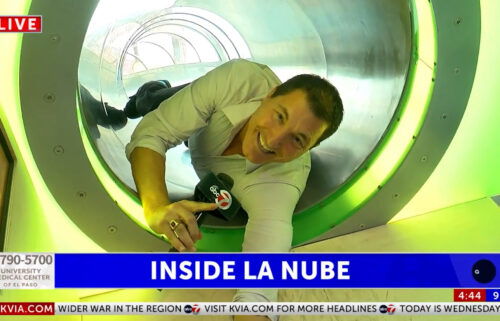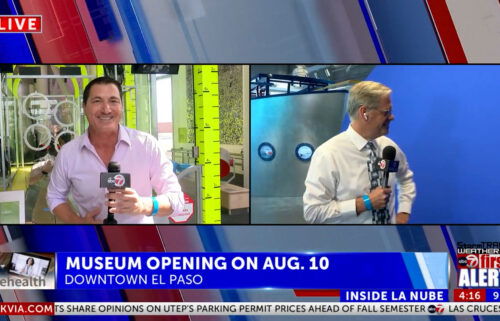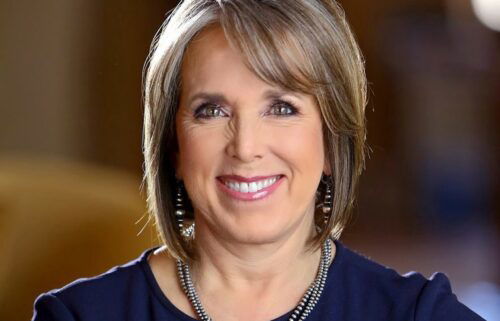Utah church leaders call for justice and change
Click here for updates on this story
SALT LAKE CITY (KSL) — Rev. Vinnetta Golphin-Wilkerson, pastor of the Granger Community Christian Church in West Valley City, didn’t intend to speak on Tuesday when multiple faiths congregated in front of First United Methodist Church for a rally over the death of George Floyd while in Minneapolis police custody.
But after numerous leaders representing Methodists, Unitarian Universalists, Baptists, Judaism, and more spoke to the crowd of about 50, Rev. Golphin-Wilkerson felt compelled to add her voice, too.
“I was going to stand in the crowd, cheer appropriately and be quiet,” said Rev. Golphin-Wilkerson, the only black clergy in attendance. “I am amazed to see you here. Five years ago, we did this before, we stood in front of the Unified Police Department and talked about the same kind of problems, and we are back again.”
She doesn’t want that cycle to continue. She raised a finger to the sky and urged the crowd to take action, to make sure that in the years to come rallies over police brutality no longer have to happen.
“I would ask you to do one thing,” Rev. Golphin-Wilkerson said. “Ask your legislator, you governor, your lieutenant governor, your police chiefs to do one thing: pass a law that stops this kind of attack on human beings. Can they say in the state of Utah nobody else will have their air cut off from them in order to be arrested, no matter what they did? Can we do that one thing? If we do that one thing, we will save lives.”
The rally was a way for church leaders in the state to add their voice to the call for justice for Floyd and the many others who have been affected by police brutality.
“We are giving voice and presence to the people whose voice has been silenced; to the people whose breath has been snuffed out,” Rev. Elizabeth McVicker, pastor of First United Methodist Church. “We are here making a stand for not just human justice, but God’s justice.”
Many in the crowd held signs to the street as people in cars honked in support of the rally as they drove by. Some of the signs read, “All persons are of sacred work,” “No child of God should be murdered by police,” and “People of faith, speak out.” The crowd stayed on the corner even after the speakers had finished with their remarks.
“We have an opportunity now to say that justice matters and that it matters always,” Rev. Marijke B. Rossi of Holladay United Church of Christ said before offering up a prayer for Floyd.
For that justice to come, Rev. Curtis Price, pastor of First Baptist Church of Salt Lake City said, everyone — especially police officers — must admit there is a problem.
“Good cops must start acknowledging that this issue is real,” Rev. Price said. “We aren’t just making it up. The system is stacked against communities of color and until we start acknowledging all of that, I’m not sure what can be done no matter how many peaceful rallies we have.”
While there were pleading prayers and voices filled with sadness, in the end, it was a rally of hope — hope for a better world and hope for change. Rev. Price said it was imperative that he, a white man with a platform, and others like him use their voices to reach the ears of those in power so that change can happen.
“I’m hopeful because there is a solution,” Rev Price said. “If good cops start rejecting training that turns our police officers into soldiers instead of peacekeepers then there is hope. If the people in charge begin demanding better training and de-escalation across cultures and empathy then there is hope.”
And if that doesn’t happen, then Rev. Price said the community must continue to rally behind the black community.
“If they don’t we will continue to rally,” he said. “We will continue to march. We will continue to vigil. We will write letters and emails and call our legislators and call our governor and meet with lawmakers and vote them out if we don’t see reform.”
With an empowering voice and a single finger lifted in the air, Rev. Golphin-Wilkerson rallied the small crowd to help bring that reform so more deaths might be avoided.
“Write a letter, send an email, make a phone call, drop by and tell the people that represent us that we don’t want to see another person die like this,” she said. “Not here on our watch.”
Please note: This content carries a strict local market embargo. If you share the same market as the contributor of this article, you may not use it on any platform.




